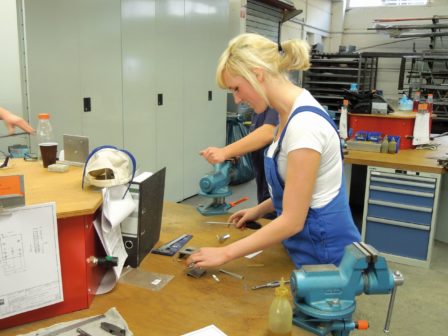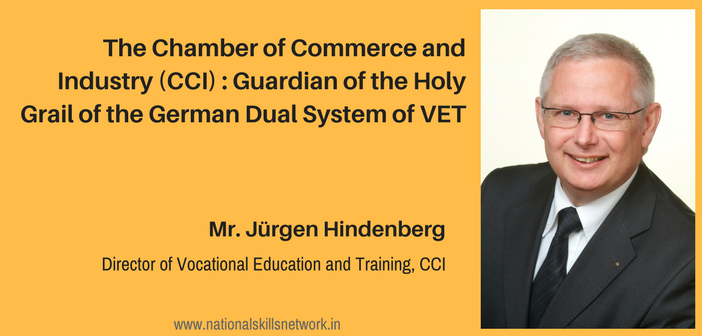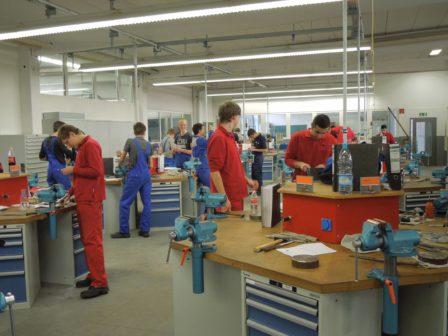The Chamber of Commerce and Industry in Germany is integral to Vocational Education and Training System. In this article, Mr. Jürgen Hindenberg, Director for VET/Securing Skilled Personnel for (CCI) presents an account of the role of the chambers highlighting the importance and sanctity attached to it.
The round table of the German dual system of vocational education and training is made up of many knights and advocates. Yet, with approximately two thirds of the statutory registered vocational training contracts, the Chambers of Commerce and Industry (CCIs) are at the forefront.
But how exactly is their prominent role defined?
In short: The CCI guarantees quality assurance in and of the dual system of vocational education and training (VET). But before we go into further detail regarding quality management, let me briefly explain the unique system of VET in Germany.
 A combination of theory and practice is the key to the success of the dual system. This two-tier system consists of two learning environments, where the training is divided between a vocational school (teaching the theory) and an apprenticeship in a company (for learners to acquire practical skills). The knowledge obtained in school can be directly applied in the company or vice versa. Vocational training students work alongside their specially-qualified company trainers in real-life authentic business situations. They are embedded in the working routine of day to day business. This makes the dual system of VET an excellent means of training on the job.
A combination of theory and practice is the key to the success of the dual system. This two-tier system consists of two learning environments, where the training is divided between a vocational school (teaching the theory) and an apprenticeship in a company (for learners to acquire practical skills). The knowledge obtained in school can be directly applied in the company or vice versa. Vocational training students work alongside their specially-qualified company trainers in real-life authentic business situations. They are embedded in the working routine of day to day business. This makes the dual system of VET an excellent means of training on the job.
Yet, not all companies offer VET. The German Vocational Training Act (BBiG) and the Crafts Code (HwO) require all training companies to meet certain criteria. Companies and small businesses have to be certified and qualified prior to offering vocational training to trainees. The chambers determine whether a company is suitable or not and their authorisation is subject to regular review. This is one of the fundamental instruments for assuring high quality training.
 The Chamber of Commerce and Industry Bonn / Rhein-Sieg, for example, had a total of 52,800 companies in 2016 of which (only) 2,177 have been officially approved as certified training companies. The authorisation procedure implies that companies meet the following requirements:
The Chamber of Commerce and Industry Bonn / Rhein-Sieg, for example, had a total of 52,800 companies in 2016 of which (only) 2,177 have been officially approved as certified training companies. The authorisation procedure implies that companies meet the following requirements:
- The company as such needs to be suitable and entitled to offer vocational training, i.e., the working environment must be ‘training-friendly’
- These businesses must meet particular safety measures and legal standards – especially for apprentices who are below the age of 18
- The company must name specially qualified personnel that mentor and monitor the trainees
- These in-company trainers must take and pass the trainer certification, which requires them to demonstrate their personal and technical aptitude in accordance with the trainer certification regulation (AEVO)
- All qualified in-company trainers are personally known to and registered with the CCI.
CCI experts, so-called training consultants, check the compliance with these criteria before issuing authorisation to a company. Moreover, training companies are subject to regular unannounced visits and inspections. And finally, the CCI experts reserve the right to immediately withdraw training authorisation in case of any non-compliance.
The CCI training consultants offer regular annual meetings for company trainers in their respective training professions, thus providing a platform for exchange with regard to any legal amendments or changes or possible difficulties. They also support and offer advice to students, employees, training staff and employers on all VET matters.
Furthermore, the Vocational Training Act (BBiG) and the Crafts Code (HwO) call for all contracts to be officially and legally registered with either the responsible Chamber of Commerce and Industry or the relevant Chamber of Crafts. Among other things, this is to ensure that no apprentice is subjected to any form of discrimination. Therefore, for example, all training contracts are subject to a verification process prior to registration, checking issues such as the individual training allowance, probationary period, holiday entitlement and duration of training to name but a few.
More than 1,000 examiners are responsible for the national VET intermediate and final exams – solely for Bonn / Rhein-Sieg. The examination boards consist of representatives from the so-called social partners, i.e., trade unions, labour associations and representatives from vocational schools. These social partners work very closely together in order to guarantee, nation wide high quality standards.
 The training certificate does not necessarily have to mark the end of a VET career. The further training organisations of the CCIs offer a wide selection of continuing training courses for further professional development. More than 314,000 apprentices and 64,000 skilled employees in continuing education are examined and supervised by the CCIs throughout Germany each year. Skilled employees receive a Bachelor-CCI or Masters-CCI diploma, classified at either level 6 or level 7 of the German qualification framework (DQR), thus making the qualification internationally comparable.
The training certificate does not necessarily have to mark the end of a VET career. The further training organisations of the CCIs offer a wide selection of continuing training courses for further professional development. More than 314,000 apprentices and 64,000 skilled employees in continuing education are examined and supervised by the CCIs throughout Germany each year. Skilled employees receive a Bachelor-CCI or Masters-CCI diploma, classified at either level 6 or level 7 of the German qualification framework (DQR), thus making the qualification internationally comparable.
Consequently, the Chambers are the most significant statutory supervisory bodies of VET in all conceivable matters. These essential findings mean that the CCIs are the predestined ‘guardians’ of high quality national standards in VET around this round table of knights and advocates.
The German dual system of VET is widely acknowledged and highly regarded around the world. With approximately 344 training professions, the Chambers offer a wide range of VET occupations as well as further training opportunities for skilled employees.
Thanks to the dual system of VET, Germany not only has the lowest youth unemployment rate in Europe, our training system is also an integral part of the German economy and is thus a driver of economic sustainability and a guarantee of prosperity. Despite this fact, it remains under constant review and change.
On this note, it should, however, also be stressed that the sword Excalibur of the dual system must be sharpened in terms of countering the increasing delusion of academicisation, even in non-business-related university courses, which is threatening German VET. Certified workers CCI are one of the keys to national prosperity, economic strength and stability. The knights and advocates of the round table of the dual system of vocational education and training will therefore not tire in strengthening and promoting this unique system of Dual vocational education and training worldwide.
About the author
 Jürgen Hindenberg is currently the Director for Vocational Education and Training/Securing Skilled Personnel of the Chamber of Commerce and Industry Bonn/Rhein-Sieg (CCI). He is also currently serving as the Chairman of the Board of the Association “Common Educational Workshops and Training Centre” (GLW) of the CCI Bonn/Rhein-Sieg. And he is the Chairman of the Bachelor Professional School (CCI), which the CCI Bonn/Rhein-Sieg runs as a special purpose association in cooperation with the City of Troisdorf near Bonn.
Jürgen Hindenberg is currently the Director for Vocational Education and Training/Securing Skilled Personnel of the Chamber of Commerce and Industry Bonn/Rhein-Sieg (CCI). He is also currently serving as the Chairman of the Board of the Association “Common Educational Workshops and Training Centre” (GLW) of the CCI Bonn/Rhein-Sieg. And he is the Chairman of the Bachelor Professional School (CCI), which the CCI Bonn/Rhein-Sieg runs as a special purpose association in cooperation with the City of Troisdorf near Bonn.













Comments 1